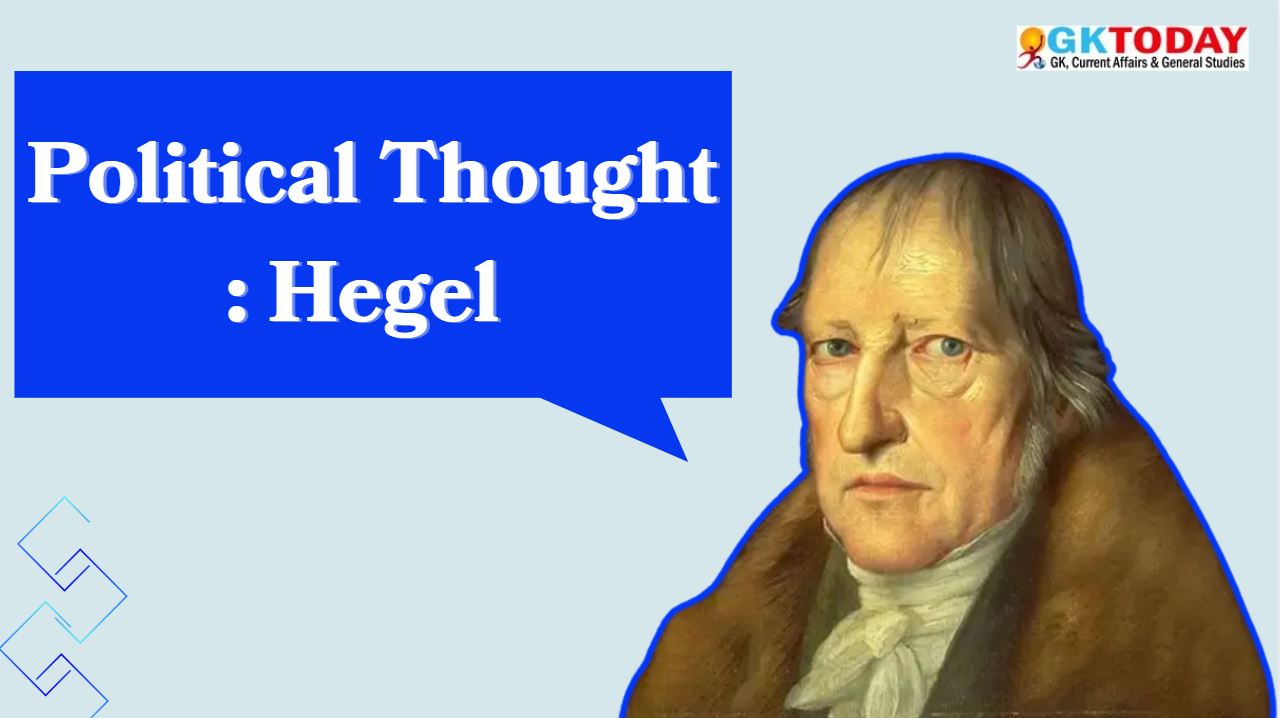UGC-NTA NET Political Science – Political Thought: Hegel
Georg Wilhelm Friedrich Hegel was a very important figure in Western philosophy. His ideas shaped modern political thought and continue to influence various fields. Hegel’s work explored the nature of reality, consciousness, and freedom.
Biographical Overview
Hegel was born on August 27, 1770, in Stuttgart, Germany. He studied at the University of Tübingen, where he was influenced by prominent philosophers like Kant, Fichte, and Schelling. Hegel held professorships at several prestigious universities, including Jena, Heidelberg, and Berlin. He died on November 14, 1831, in Berlin.
Philosophical Contributions
Dialectical Method
Hegel introduced the dialectical method, a process involving three stages:
- Thesis – An initial proposition or idea.
- Antithesis – A counter-proposition that contradicts the thesis.
- Synthesis – A resolution that reconciles the thesis and antithesis, leading to new understanding.
This method illustrates how contradictions drive the development of ideas.
Absolute Idealism
Hegel’s philosophy posits that reality is the manifestation of an absolute spirit or mind. He argued that all aspects of existence are interconnected and reflect a higher rational structure.
Phenomenology of Spirit (1807)
In this seminal work, Hegel explores consciousness and self-awareness. He outlines stages of consciousness:
- Sense-certainty
- Perception
- About
- Self-consciousness
- Reason
- Spirit
- Religion
- Absolute knowledge
These stages illustrate the evolution of human consciousness.
Science of Logic (1812-1813)
Hegel examines the nature of thought and reality. He categorises being, essence, and concept as fundamental elements of his logical framework.
Political Philosophy
The Philosophy of Right (1820)
Hegel’s political work centres on the concept of freedom. He defines freedom as the realisation of rational will. Ethical life, or Sittlichkeit, integrates individual freedom within social institutions.
State and Civil Society
Hegel distinguishes between civil society and the state. Civil society represents individual interests, while the state embodies universal interest. He argues that the state actualises ethical life.
Freedom
For Hegel, true freedom arises within social and political institutions. He emphasises the state’s role in facilitating freedom, contrasting with purely individualistic notions.
Historical Development
History as Rational Process
Hegel views history as a rational process. Each historical epoch reflects a stage in the development of human freedom. This perspective suggests that history is purposeful and progressive.
World Spirit
The World Spirit concept posits that history manifests a rational process leading to the realisation of freedom. This idea puts stress on the interconnectedness of historical events and human development.
Influence and Legacy
Influence on Marxism
Hegel’s dialectical method influenced Karl Marx. Marx adapted Hegel’s ideas to material conditions, forming the basis of historical materialism.
Impact on Existentialism and Phenomenology
Hegel’s work inspired existentialist and phenomenological thinkers, including Kierkegaard, Heidegger, and Sartre. His exploration of consciousness laid the groundwork for their inquiries into existence.
Contemporary Relevance
Hegel’s ideas remain relevant in political theory, philosophy, and social theory. His work continues to inform discussions on freedom, ethics, and the nature of reality.
Key Concepts
Recognition (Anerkennung)
Recognition is vital for the development of self-consciousness and freedom. Hegel argues that mutual recognition between individuals encourages individual identity.
Alienation
Alienation describes the process where individuals become estranged from their essence and community. Hegel links this concept to the development of self-consciousness.
Sittlichkeit (Ethical Life)
Sittlichkeit refers to ethical life as the realisation of freedom within social institutions. It encompasses family, civil society, and the state as integral components of ethical life.
Critiques
Criticism of Idealism
Hegel faced criticism for his idealism, which some argue neglects material conditions and practical realities. Critics claim that his philosophy is overly abstract.
Misinterpretations
Hegel’s work has been subject to various interpretations. These have led to differing ideological applications, such as conservative and radical readings of his philosophy.
Key Works
Hegel produced several influential texts, including:
- Phemonology of Spirit (1807)
- The Science of Logic (1812-1813)
- The Philosophy of Right (1820)
- Lectures on the Philosophy of History (1837, posthumously published)
Important Terms
About Hegel’s philosophy requires familiarity with key terms:
- Thesis – An initial idea in the dialectical process.
- Antithesis – A conflicting idea that challenges the thesis.
- Synthesis – A resolution that reconciles the thesis and antithesis.
- Absolute Spirit – The ultimate reality in Hegel’s idealism.
- World Spirit – The rational process that unfolds throughout history.
- Recognition (Anerkennung) – The mutual acknowledgment necessary for self-consciousness.
Despite critiques and misinterpretations, Hegel’s legacy continues to shape contemporary discussions in philosophy and political theory. His work provides valuable vital information about the nature of reality, consciousness, and the role of the state in achieving true freedom.


